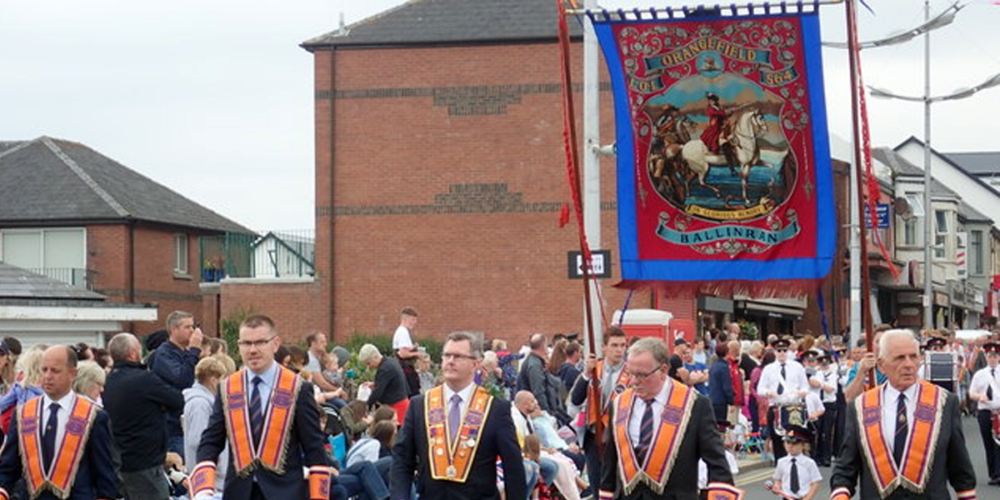Anthony McIntyre ☠ The leader of the DUP is down and perhaps out long before the count reaches ten, and the beak's bell has sounded.
The political class is trying to steady the ship and inform the public that the power splitting vessel is still on course. Sinn Fein, despite demanding a general election in this part of the country following Leo Varadkar's shock resignation as Taoiseach, is against any such thing in the North. Yet, things might not just go as smoothly as the political establishment would wish. The current Stormont operation was very much Donaldson-driven. His ability to deliver did not go without serious challenge. There are still plenty of opponents willing to rush into a vacuum which they hope even the large frame of Gavin Robinson will be unable to fill. Steering clear of the rocks marked peace process crisis will require the most dextrous of hands at the wheel and a bird's-eye view of the storm clouds that are gathering.
While a legal and judicial process will ultimately decide whether he is culpable, the mirror has been broken. No matter what way it is pieced together it will never reflect in the same way that it previously did. If Donaldson succeeds in his legal battle the OJ certain to be chanted by his detractors will circulate and stalk him until the end of his days. In his current situation he might wish for that end to accelerate towards him as speedily as his demise, whiskey washed down by a bullet: a bottle in one hand, a pistol in the other.
Whatever transpires, there will be a victim at the end of the process. If Donaldson is guilty, he leaves in his wake the devastation of those who underwent a horrendous experience. If he is innocent then he is the victim of an equally horrendous life changing accusation.
Gavin Robinson has been swiftly ushered in as the interim replacement leader of the DUP. Hailing from the republican side of the house, where feet dragging and deflection has been the stock-in-trade response to managing sexual abuse concerns, I find the speed with which the DUP acted - it had little choice - almost as breathtaking as the news of the allegation against its former leader.
Whatever transpires, there will be a victim at the end of the process. If Donaldson is guilty, he leaves in his wake the devastation of those who underwent a horrendous experience. If he is innocent then he is the victim of an equally horrendous life changing accusation.
Gavin Robinson has been swiftly ushered in as the interim replacement leader of the DUP. Hailing from the republican side of the house, where feet dragging and deflection has been the stock-in-trade response to managing sexual abuse concerns, I find the speed with which the DUP acted - it had little choice - almost as breathtaking as the news of the allegation against its former leader.
The event has been anything but easy to process, arriving like an assault on the senses, disorganising thoughts and plans. Such has been the abnormal force with which it hurtled into the midst of a normal day, much of the day's ruminating has been given over to it. It has eaten into chunks of relaxation time. At last night's Drogheda United game, the phone constantly pinged with memes. One benefit of the clash being a scoreless draw was that I didn't miss any goals as a result of constantly glancing at my phone.
When my wife prodded me awake in the small hours of Good Friday to tell me that the rumour will was buzzing with Donaldson innuendo after reports of a 61 year old being charged with serious sex offences it took me back to the same early hours of Good Friday five years ago when then too I had been nudged out of my slumber by her to be told that Lyra McKee had been killed in Derry. Conspiracy theories, similar to that expressed by Jamie Bryson, quickly wandered into my mind and were as swiftly dispatched.
Gavin Robinson would seem to have had precisely this type of sentiment in mind when he bewailed the alacrity with which schadenfreude found its voice:
When my wife prodded me awake in the small hours of Good Friday to tell me that the rumour will was buzzing with Donaldson innuendo after reports of a 61 year old being charged with serious sex offences it took me back to the same early hours of Good Friday five years ago when then too I had been nudged out of my slumber by her to be told that Lyra McKee had been killed in Derry. Conspiracy theories, similar to that expressed by Jamie Bryson, quickly wandered into my mind and were as swiftly dispatched.
Over recent weeks I have many times publicly questioned why Jeffrey Donaldson divided unionism, why he agreed to such a treacherous deal damaging to unionism & why he kept making demonstrably false claims. It was beyond comprehension. Perhaps now it’s a lot clearer.
Gavin Robinson would seem to have had precisely this type of sentiment in mind when he bewailed the alacrity with which schadenfreude found its voice:
there will be some, and there have already been some, who have sought to score cheap political points, who have sought to engage in conspiracy theories, who somehow enjoy or will manipulate such devastating news for those involved.
 |
| ⏩Follow on Twitter @AnthonyMcIntyre. |
















